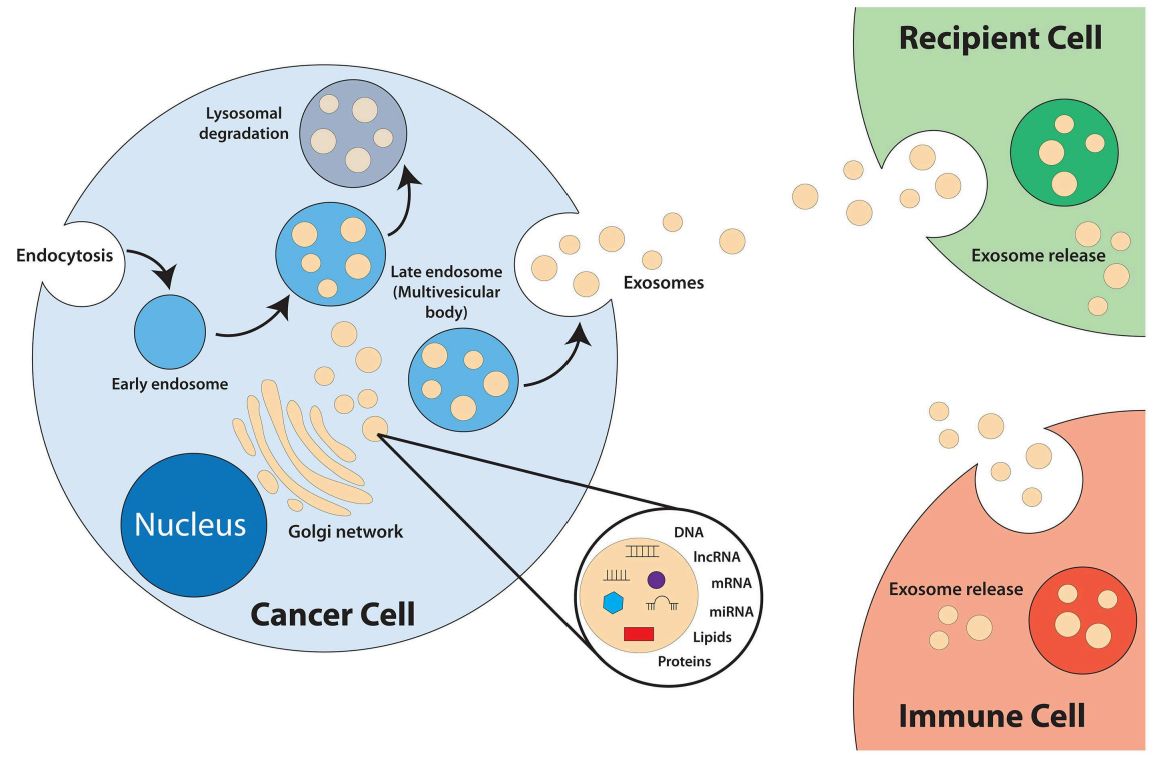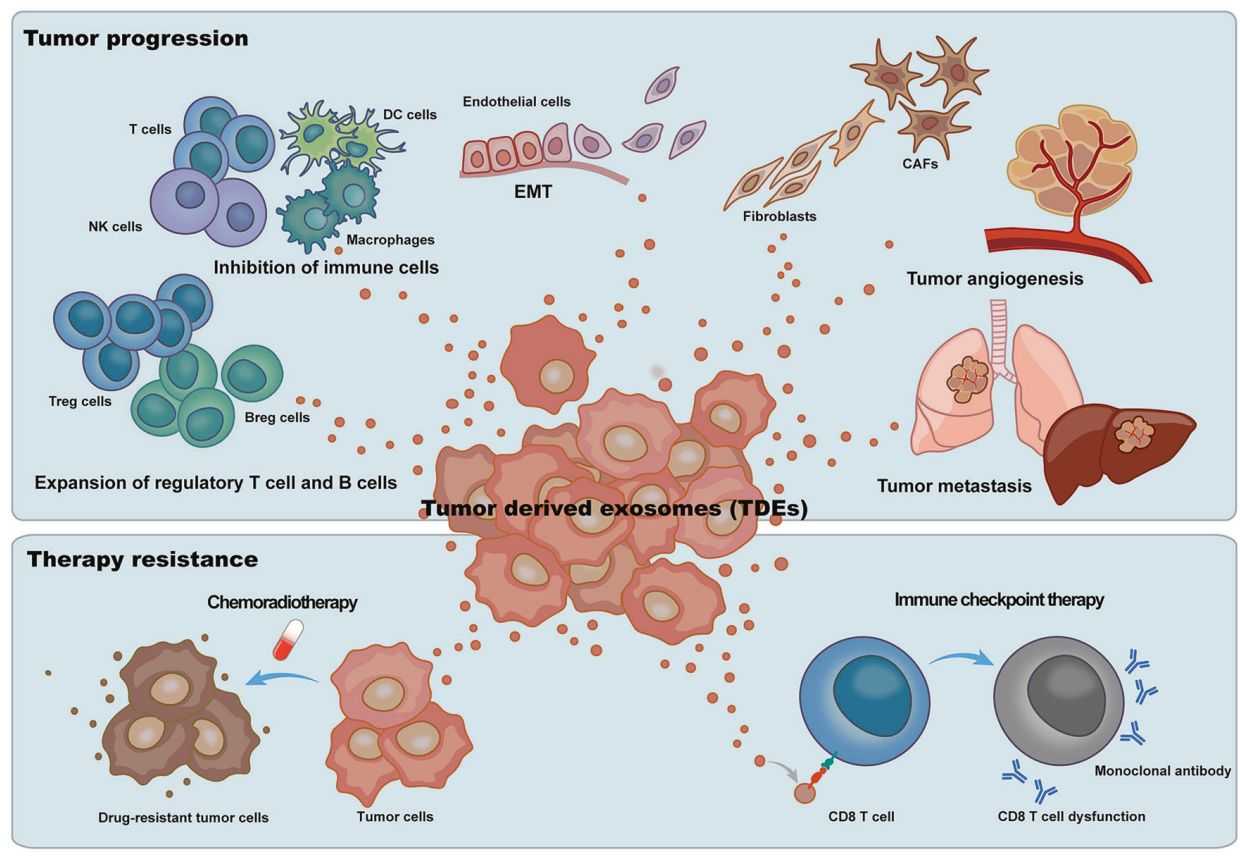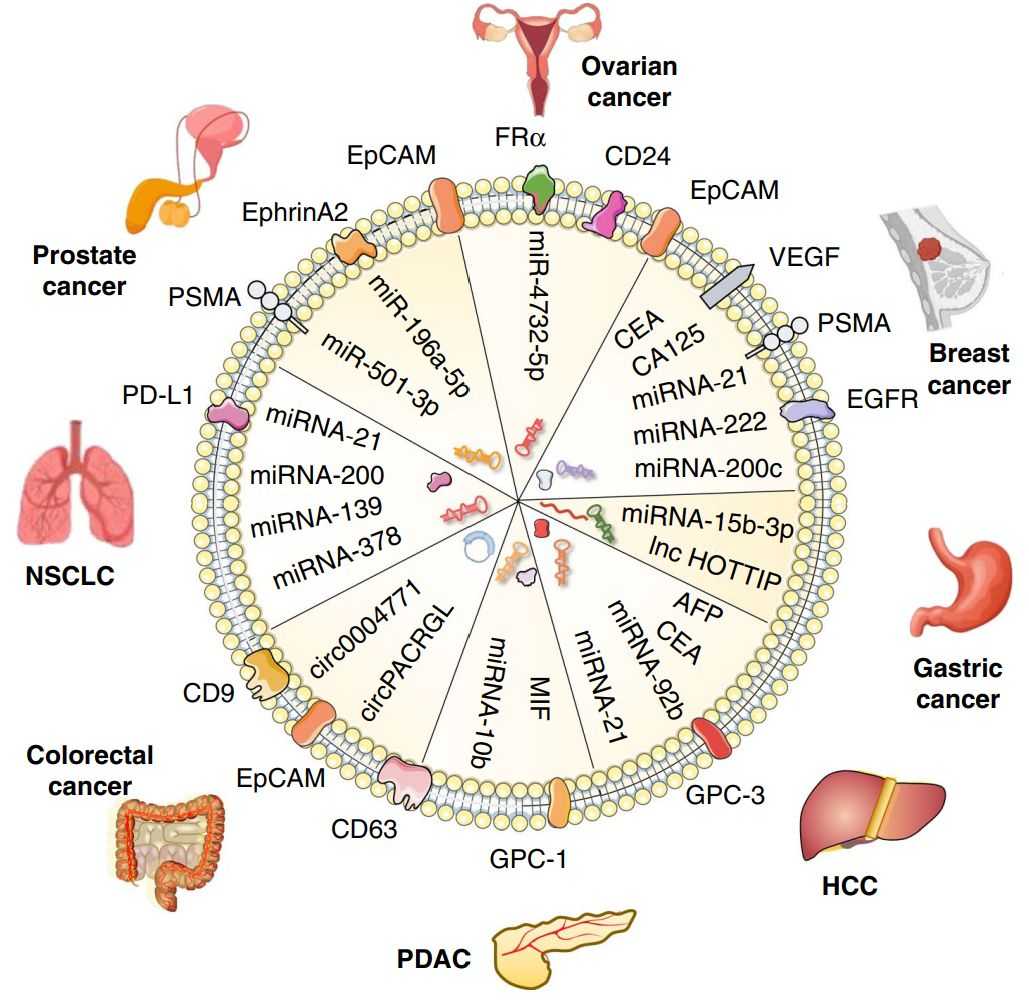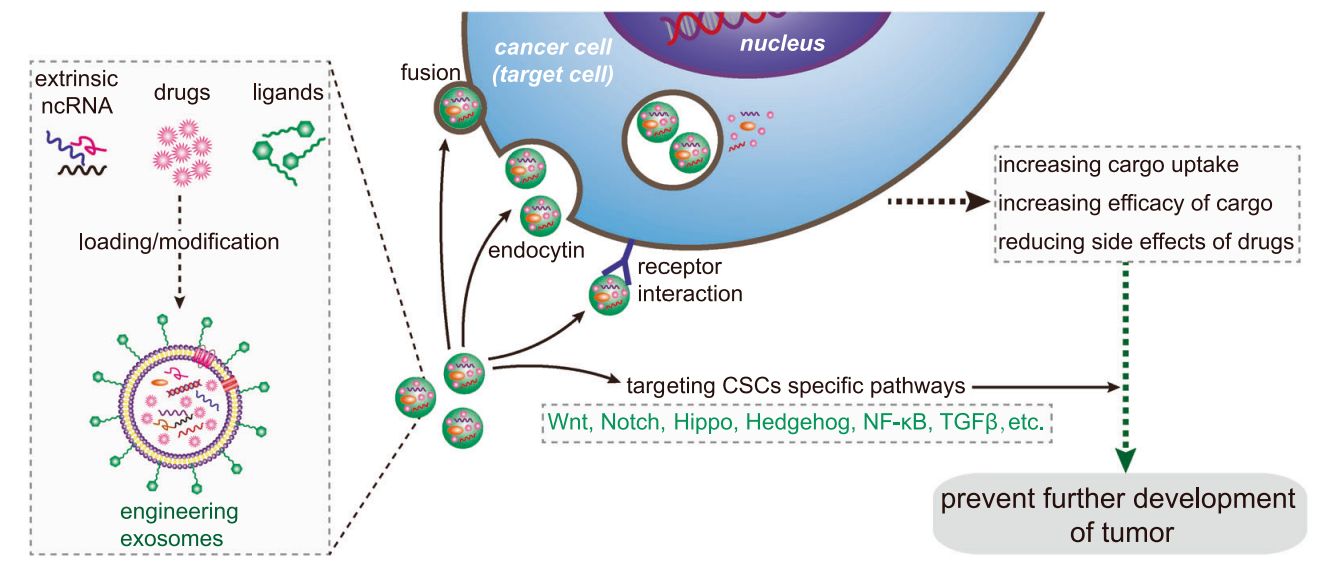Exosomes in Cancer Diagnostics and Therapies
With research development, there are more studies about exosomes in the direction of carrier drugs, diagnosis, prognosis monitoring, and immunotherapy. Exosomes have been found to play an important role through molecular messaging in various health and disease models and have great application prospects in the medical field. For example, exosomes are recognized as biomarkers and prognostic factors for cancer and have important clinical diagnostic and therapeutic implications.
What are Tumor-derived Exosomes (TDEs)?
Exosomes are nanosized extracellular vesicles derived from the endocytosis pathway. They are found in a wide variety of body fluids, including blood, saliva, tears, and urine. Exosomes transport proteins, lipids, nucleic acids, and other metabolites, and serve as intracellular carriers that play a key role in regulating intercellular communication.
 Figure 1. Biosynthesis of tumor-derived exosomes. (Othman N, et al., 2019)
Figure 1. Biosynthesis of tumor-derived exosomes. (Othman N, et al., 2019)
In recent years, tumor-derived exosomes (TDEs) have been considered an ideal drug delivery vehicle for cancer therapy with multiple advantages:
- TDEs have low immunogenicity, high stability, and targeting ability.
- Unlike individual proteins or small molecules, TDEs contain heterogeneous molecules that ensure good biodistribution, pharmacokinetics, and cellular uptake of exosomes in the human body, making them easier for therapy.
- TDEs can effectively protect the integrity of therapeutic drugs in the body, greatly improve the bioavailability of drugs, reduce the toxic side effects of drugs, and maximize anti-tumor efficiency.
The table below shows the products we offer.
| Cat No. | Product Name | Source |
| Exo-CM01 | HQExo™ Exosome-B16F10 | Exosome derived from murine melanoma cell line (B16F10 cell line) |
| Exo-CH02 | HQExo™ Exosome-A549 | Exosome derived from human non-small cell lung cancer cell line (A549 cell line) |
| Exo-CH04 | HQExo™ Exosome-H196 | Exosome derived from Human small cell lung cancer cell line (H196 cell line) |
| Exo-CH06 | HQExo™ Exosome-MCF-7 | Exosome derived from human breast cancer, noninvasive cell line (MCF-7 cell line) |
| Exo-CH09 | HQExo™ Exosome-DAUD1 | Exosome derived from human burkitt lymphoma cell line (DAUD1 cell line) |
| Exo-CH10 | HQExo™ Exosome-HCT116 | Exosome derived from human colorectal carcinoma cell line (HCT116 cell line) |
| Exo-CH11 | HQExo™ Exosome-K-562 | Exosome derived from human pleural effusion, leukemia chronic myelogenous (K-562 cell line) |
| Exo-CH16 | HQExo™ Exosome-COLO1 | Exosome derived from human colon carcinoma (COLO1 cell line) |
| Exo-CH17 | HQExo™ Exosome-HT29 | Exosome derived from human adenocarcinoma (HT29 cell line) |
| Exo-CH21 | HQExo™ Exosome-A375 | Exosome derived from human malignant melanoma cell line (A375 cell line) |
| Exo-CH24 | HQExo™ Exosome-SK-BR-3 | Exosome derived from human breast carcinoma cell line (SK-BR-3) |
| Explore All Exosomes Isolated from Cancer Cell Lines | ||
Exosomes are Involved in Tumorigenesis, Progression, and Drug Resistance
TDEs play an important role in the development and progression of cancer. Exosomes can promote the proliferation of cancer cells, spread, and help cancer cells to escape the clearance mechanism.
 Figure 2. Tumor-derived exosomes play a key role in tumor progression. (Li Y, et al., 2022)
Figure 2. Tumor-derived exosomes play a key role in tumor progression. (Li Y, et al., 2022)
- Promoting Tumorigenesis
TDEs cause the deterioration of peripheral cells by transporting miRNAs as well as oncogenic proteins. It has been demonstrated that exosomes secreted by prostate cancer cells induce mesenchymal-epithelial transformation and development of cancer cells by transporting Rab proteins, Ras transcripts, and oncogenic miRNAs, which downregulate the tumor suppressors PDCD4 and Lats2. In addition, exosomes can promote tumorigenesis by transferring oncogenes to target cells through horizontal gene transfer.
- Promoting Tumor Progression
MET proteins, oncogenic receptor tyrosine kinases that promote tumor cell proliferation and migration, are often activated in tumor cells. Studies have found that melanoma-derived exosomes can play a role in tumor metastasis. MET proteins in exosomes are increased in patients with advanced melanoma and demonstrated that melanoma-derived exosomes promote metastasis in bone marrow-derived cells through the formation of a pre-metastatic microenvironment and increased angiogenesis. In addition, exosomes can be systemically disseminated through circulation, which in turn increases the ability of tumors to metastasize.
- Promoting Drug Resistance in Tumors
Exosomes produce chemotherapy resistance by passing proteins and miRNAs between cancer cells, the main pathways include:
1. Increasing the efflux of chemotherapeutic drugs.
2. Inducing drug resistance in recipient cells through self-carried proteins or nucleic acids.
3. Avoiding cell damage by toxic drugs through immune escape.
4. Inducing chemoresistance in target cells by enhancing autophagy and inhibiting apoptosis.
Exosomes in Cancer Diagnosis
Exosomes are small vesicles secreted outward by cells, therefore, exosomes are characterized by the material composition of donor cells and have certain cell specificity. It has been found that exosomes secreted by cancer cells contain characteristic molecules that can be used to differentiate exosomes from other cells and can be used as biomarkers for cancer diagnosis.
 Figure 3. Exosomes in cancer liquid biopsy. (Yu D, et al., 2022)
Figure 3. Exosomes in cancer liquid biopsy. (Yu D, et al., 2022)
- Exosomal Proteins for Cancer Diagnosis
Numerous studies have shown that TDEs generally carry proto-oncoproteins and oncoproteins. The characteristics that are different from normal exosomes allow these protein molecules in TDEs to be used as markers for cancer diagnosis and prognostic recurrence risk assessment. For example, in prostate cancer diagnosis, the exosomal Survivin protein test is more accurate than the traditional blood PSA protein test. The exosomal protein Claudin-4 can be used in ovarian cancer diagnosis. In addition, the exosomal protein Glypican-1 found in pancreatic cancer can be used for both early cancer diagnosis and as a good prognostic tool.
- Exosomal Nucleic Acids for Cancer Diagnosis
It has been found that exosomal miRNAs can be used as cancer diagnostic markers. Seven miRNAs in colorectal cancer exosomes can be used as diagnostic markers for colorectal cancer in various stages. Exosomal miR-21 and miR-1246 can be used as markers for breast cancer detection. In addition to this, exosomal miRNA can be used as a means of cancer prognosis recurrence risk assessment. Exosomal miR-19a can be used to assess the cure rate of colorectal cancer. It has been found that colorectal cancer patients with high levels of exosomal miR-19a are prone to liver metastasis, have a high prognostic recurrence rate, and have a low 5-year survival rate. In addition to miRNA-based markers, other nucleic acid molecules in exosomes have been found to serve as markers for cancer diagnosis, such as small non-coding RNAs and DNA.
Exosomes in Cancer Therapy
Exosomes not only provide molecular detection markers for cancer diagnosis but also can be used in cancer therapy. Currently, exosomes are more studied in cancer applications as a tool for cancer therapy. In addition, researchers have also found that exosomes can be used directly as a target for cancer therapy.
 Figure 4. Engineered exosomes as delivery vehicles for precise tumor targeting. (Dai J, et al., 2020)
Figure 4. Engineered exosomes as delivery vehicles for precise tumor targeting. (Dai J, et al., 2020)
- Exosomes as a Tool for Cancer Therapy
Exosomes can be used as a tool for cancer immunotherapy. Currently, more mature research is to isolate exosomes from dendritic cells from tumors, then carry out in vitro introduction of the antigenic polypeptide (MAGE), and then reintroduce the modified exosomes into the patient's body, which can activate the immune system in the body, thus promoting the immune clearance of cancer cells.
In addition, exosomes can be used as carriers for cancer therapeutic drugs and can carry various types of drugs. Through blood and other body fluids transportation and delivery, exosomes can be absorbed by cancer cells, realizing the targeted treatment of cancer by drugs. For example, exosomes can enhance the uptake of drugs from the bloodstream into the brain tissue, effectively treating cancerous lesions in the brain.
- Exosomes as a Direct Target for Cancer Therapy
Studies have found that exosomes are directly involved in the development and progression of cancer. It carries oncogenic factors that lead to cancerous changes in receptor cells, metastasis, and spreading of cancer cells; meanwhile, exosomes can inhibit the activity of immune cells, which allows cancer cells to escape from the immune system and be removed. Therefore, by specifically removing exosomes of cancer cell origin, the suppression of the immune system can be lifted, thus realizing the treatment of cancer. In addition, some studies have directly targeted exosomes as drugs, such as inhibiting the synthesis and secretion of exosomes and hindering the uptake of exosomes by recipient cells.
Summarization
The potential of exosomes in the field of cancer research nowadays includes three main directions.
1. The first is the potential of exosomes in diagnosis, exosomes extracted from the microenvironment of a case can be used as a biomarker for the diagnosis and prognosis assessment of cancer.
2. The second is the potential of exosomes in cancer immunotherapy. Exosomes are produced by a variety of cells and interact with target cells in a variety of ways to produce therapeutic effects.
3. Finally, there is the potential of exosomes for drug delivery. Exosomes can be used to deliver RNA, proteins, small molecules, and other drugs for cancer therapy.
Although research on exosomes in tumor-related fields has been carried out, and it has been confirmed that they play an important role in tumorigenesis, development, drug resistance, etc., it is still necessary to clarify their intrinsic connection through more detailed molecular mechanisms. It not only provides new targets for improving the efficacy of chemotherapy for tumors but also provides new ideas for the development of precision tumor therapy.
As a leader in the field of exosome research, Creative Biostructure provides cutting-edge exosome products and one-stop exosome services to help clients delve deeper into the enormous potential of exosomes in advancing cancer diagnosis and treatment. We strive to provide innovative solutions for cancer treatment. Feel free to contact us for more information.
References
- Othman N, et al. Cancer-Derived Exosomes as Effectors of Key Inflammation-Related Players. Front Immunol. 2019. 10: 2103.
- Li Y, et al. Targeted inhibition of tumor-derived exosomes as a novel therapeutic option for cancer. Exp Mol Med. 2022. 54(9): 1379-1389.
- Yu D, et al. Exosomes as a new frontier of cancer liquid biopsy. Mol Cancer. 2022. 21(1): 56.
- Dai J, et al. Exosomes: key players in cancer and potential therapeutic strategy. Signal Transduct Target Ther. 2020. 5(1):145.